#read the whole thing
Text
The reproductive function of a woman is the only innate function which distinguishes women from men. It is the critical distinction upon which all inequities toward women are grounded. It is, therefore, crucial for women to understand clearly what the nature of this function is, how it is to be defined, and in what relationship the reproductive function stands to a woman.
The reproductive function is a special ability, capacity, or talent held by women. This function is a property which determines their womanhood. The distinction between this function and the usual sense of property is that the latter is static, or primarily spatial, while the former is operational, or exists over time. The reproductive function has the status of property because of its definitive nature.
. . .
The Constitution of the United States, in the Fourteenth Amendment, clearly protects the life, liberty, and property of every person. Any legislation interfering in any way with any woman's self-determination of her reproductive process is clearly unconstitutional. It would interfere with her life by interfering with her person; it would interfere with her liberty by interfering with her freedom of choice as regards her own person; it would interfere with her property since her reproductive process constitutes, in the most integral and strictest sense, her property.
-Ti-Grace Atkinson, Amazon Odyssey
#ti-grace Atkinson#abortion#pregnancy#amerika#radical feminist theory#read the whole thing#usa is a failed state
61 notes
·
View notes
Text
A young man’s lament
Death, a concept seldom spoken of and almost always presented in a negative light; is an abstraction that I have been recently consumed by. Those of us who know the struggles of mental health(almost all of us)know that sometimes death may seem like the answer, and I am here to tell you… that it is.
It is now known that the way concepts are framed in their teaching are at the very least, just as important as the logistics behind the concepts themselves. And death has been presented to us in a way that is innately definite and almost purely physical. “To die is to be gone”. But In my hyper focus and borderline neurotic obsession on the topic I have discovered that this is only one way to look at death and rarely applies to the situation at hand.
Following this thought process I began to question why humans feel the need sometimes to die, logistically this makes no sense, there is no reason biologically for this need to exist, so why do we do it? It’s because inherently; death is a necessary aspect of life, but not in the physical sense that we have been taught, but rather in the mental and emotional sense.
The paradoxical nature of in the genesis of life you are simultaneously rushing headlong into death is beautiful, much like the relationship between light and dark one cannot exist without the other and this fact is the basis of my thought process.
True life/self actualization cannot exist without the death of previous aspects or sometimes, entire versions of ourselves. You don’t want to die… you want the you that’s causing you pain now to die, and that’s okay. and in my opinion necessary. So I say to you…allow this. Parts of you must die so that the new parts of you can grow and flourish, there’s simply not enough room emotionally for every single part of you that has ever existed to live, the pruning of dead or dying traits is a must.
Luckily for us the emotional plasticity found in humans is unlike any other being in this universe, meaning that even if 99% of the person that you are now died that 1% would grow into something beautiful. So trust this process, embrace death with open arms, love it as you should love yourself, knowing that without it you would not truthfully be able to live.
~with love crowned_cr0ws :)
66 notes
·
View notes
Text
Trump told donors he will crush pro-Palestinian protests, deport demonstrators
Former president Donald Trump promised to crush pro-Palestinian protests on college campuses, telling a roomful of donors — a group that he joked included “98 percent of my Jewish friends” — that he would expel student demonstrators from the United States, according to participants in the roundtable event with him in New York.
“One thing I do is, any student that protests, I throw them out of the country. You know, there are a lot of foreign students. As soon as they hear that, they’re going to behave,” Trump said on May 14, according to donors at the event.
When one of the donors complained that many of the students and professors protesting on campuses could one day hold positions of power in the United States, Trump called the demonstrators part of a “radical revolution” that he vowed to defeat. He praised the New York Police Department for clearing the campus at Columbia University and said other cities needed to follow suit, saying “it has to be stopped now.”
“Well, if you get me elected, and you should really be doing this, if you get me reelected, we’re going to set that movement back 25 or 30 years,” he said, according to the donors, who spoke on the condition of anonymity to detail a private event.
Trump has waffled publicly about whether Israel should continue its war in Gaza, saying “get it over with … get back to peace and stop killing people.” Major Republican donors have lobbied him in recent months to take a stronger stance backing Israel and its prime minister, Benjamin Netanyahu.
The private New York meeting offers new insight into his current thinking. Speaking to wealthy donors behind closed doors, Trump said that he supports Israel’s right to continue “its war on terror” and boasted of his White House policies toward Israel.
The former president didn’t mention Netanyahu, whom he resents for acknowledging Joe Biden’s victory in 2020 and hasn’t spoken to in years.
Trump has offered few policy specifics about how he would treat Israel in a second term. He cast doubt on the viability of an independent Palestinian state in a recent Time magazine interview, saying he was “not sure a two-state solution anymore is gonna work,” adding: “there may not be another idea.” A two-state solution to the Israeli-Palestinian conflict has been the end goal of U.S. policy under Democratic and Republican presidents for decades.
Trump’s campaign did not respond to detailed questions about The Washington Post’s reporting. “When President Trump is back in the Oval Office, Israel will once again be protected, Iran will go back to being broke, terrorists will be hunted down, and the bloodshed will end,” Karoline Leavitt, the campaign’s national press secretary, wrote in an email.
5 notes
·
View notes
Text
Place your hand on the ground of American politics. Keep it there a moment. You’ll feel a deep rumble like A Minor Forest “math rock” song playing off in the distance. The sound of uncontrollable discontent hangs in the air. The country’s demise beckons. Like the clown from Stephen King’s It, our national breakup smiles dementedly from beneath the storm drain, urging us toward bad choices and worse outcomes. This is the message, more or less, of Alex Garland’s new film, Civil War.
…
About 40 minutes into Civil War, there is a sequence of dialogue where Kirsten Dunst’s character, a famous war photographer coaching a young woman hoping to start out in the business, reveals the film’s primary message. The two are discussing whether they’re morally obligated to intervene in the violence they routinely see only a few feet in front of their cameras. Should they push people out of the way of bullets and missiles? What about helping medical staff when someone could be dying? In response, Dunst’s character delivers the film’s central message: “We don’t ask questions like that. We document what’s happening—so others can ask the questions.”
On a cinematic level, Garland’s second U.S. civil war—lived through the lens of a war photographer—is brilliantly filmed and imagined. However, on a political level, it’s pandering chickenshit. From beginning to end, Garland’s film is a love letter to journalists, or rather his very dated ideal of what journalists do. Over the last 35 years, American journalism has come a very long way from the Edward R. Murrow “we just document the world and don’t judge” approach. At present, establishment U.S. journalism amounts to one of two things—a happy-endings massage for wealthy elites or partisan propaganda (and often both).
…
Hollywood snobbery and bigoted anti-bigotry aside, the even larger problem with trying to persuade American viewers through a Hobbesian vision that their 50-state nation must be kept together under any circumstances is that the U.S. federal system is irreversibly broken. If one looks at the two largest areas of successful reform that have happened over the last 25 years in the U.S.—the decriminalization of marijuana and gay marriage—both started on the state level, where democratic forms still function. They each gathered steam slowly over the course of a decade or more and, only then, moved to the federal level. Yet working toward reforms on the state level can only go so far given that the federal government via the president, Congress, or its nine-member robed clerisy—appointed for life—can come in at any moment and overturn the democratic decisions of state governments. That’s a problem when the majority of the U.S. Congress and Senate is staffed by millionaires and billionaires. Those who aren’t in this elite wealth class aspire to it—and will likely achieve it—by servicing their financial betters during their time in office.
For social scientists honestly tracking American policy outcomes, it has long been known that the views of average citizens and “mass-based interest groups” have little or no independent influence on U.S. government policy. An academic study utilizing more than 1,700 variables found that economic elites dominate U.S. policy outcomes so completely that average U.S. citizens ultimately have “little or no independent influence.”
…
For all the establishment pearl-clutching over Trump’s looming reelection amounting to “losing our democracy,” the reality is that Americans haven’t lived in a democracy for a while. Rather, we reside inside an entirely new form of political economy—a corporate tyranny that masquerades in the skinsuit of our cherished republican past. If total corporate corruption of democratic processes weren’t bad enough, there’s now equally troubling ideological corruption. Nearly every one of the alphabet city agencies of the U.S. federal deep state is now staffed top to bottom by woke resistance half-wits who have zero interest in representing the views and serving the needs of their “deplorable” countrymen. Rather, they unironically understand “public service” as the act of displaying representationally correct bona fides to their childless, progress-flag waving peers in Georgetown.
…
This is the system we must be terrified of breaking down? Sorry, Alex Garland. It’s already broken. Chaos will come. That much of his vision is true. When it does, it won’t be the fault of Middle American psychopaths with pals named “Wyatt.” Should American frustration not bubble up into some form of structural-altering revolt, that would in fact be the worst possible denouement, not only for the country but humanity. That’s because the United States does indeed play a special role in the world. But it’s time we took a long look in the mirror at what America has actually become.
Due to mammoth levels of mutual investment and interdependence between Chinese and American industry, the world’s two once-diametrically opposed political orders have moved toward each other—meeting in a middle ground of authoritarian mercantilist tyranny. This Sino-American inverted juste milieu represents a genuine third way of political economy—neither liberal, nor communist, and certainly not democratic. A system perfectly approximating the Venn diagram space between the surveillance state of Nineteen Eighty-Four, the pop culture imbecility of Idiocracy, and the libertine elitism of Brave New World. A neo-feudalism of East meets West. Consumption is its church. Pursuing DEI, carbon offsets, and representational correctness provides elites with a convenient sale of indulgences. All who oppose them will be electronically canceled.
…
Progressives and leftists can wish away the structure of U.S. constitutionalism all they want, but it doesn’t change our nation’s intentional—localist—design. The central goal of the Federalists of the 1780s in constructing the U.S. Constitution was to make it tremendously difficult to pass any sweeping national legislation that threatened wealthy or propertied interests. Despite the presumptions of so many, Americans are highly unlikely to witness anything approaching the New Deal coalition or the federal functionality of the 1930s through the 1960s ever again.
If “all we need” to accomplish worthwhile federal reform is just “another FDR,” then we’re doomed. The genius relative of a former president who aspired since childhood to become the greatest U.S. president in history—then acquired polio, making him highly sympathetic to the plight of the poor—who also welcomes the hatred of his fellow uber-wealthy elites? It isn’t coming around again. In America’s independence-minded political culture and business-dominated governmental structure, the New Deal remains a fluke.
If progressives and the Alexandria Ocasio-Cortez-adoring “democratic socialists” haranguing so many people on Twitter and Facebook genuinely want an ultra-strong federal presence that offers Denmark-level social safety nets, the first step is not raging against fellow leftists online. Instead, it’s nothing less than organizing an entirely new U.S. constitutional convention. We must accept that if such a thing were to take place today, someone like Dwayne “the Rock” Johnson would end up the top nominee.
…
If you think the prospect of the United States breaking up into a half dozen new federalized arrangements is just as much of a daydream as a new U.S. constitution, please realize that the same things were said inside the Soviet Union by their politburo and establishment apparatchiks right up until September 1988. That’s the month nearly one-fourth of all Estonians came together in a music festival illegally celebrating their national culture—and demanding their independence from the USSR. Estonia’s so-called "Singing Revolution" set off a chain reaction that one year later brought down the Berlin Wall and, eventually, the globe’s second-most-powerful empire. If Texas or California declared independence from the United States—as they jointly do in Garland’s Civil War, a scenario that reflects Garland’s total ignorance of American politics—would the Pentagon really have the stomach to use federal troops against county police, state militias, and heavily armed (come and take it!) former U.S. citizens? I don’t think so.
A massive federal system cannot witness the present level of dysfunction, utter corruption, and total resistance to change and still hold together in perpetuity. The rugged do-it-yourself mentality that settled the frontier and made this barren land into a great and powerful empire is gone. We no longer live to produce but consume. Our entire waking lives are tempted by filth and poison. We eat too much. We drink too much. We’re having sex less often than ever before. We’re fatter than ever. We rarely exercise or go to church anymore. We spend money like they’re giving it out in the parking lot. To make ourselves feel big, we drive obscenely large trucks on decrepit highways and across failing bridges over dried-up water wells. We are ruled not by elected leaders but party-cartel appointed stooges—a Brezhnevian social grouping that believes that memorizing the right answers to the oligarchy’s tests represents creativity, science, and “resistance” to “fascism.”
We must try something new. Otherwise, we lose not only the chance of redeeming ourselves but whatever dignity America once had. The United States as a nation began with a localist revolt against a corrupt and disconnected overseer government. Could it really end any other way than precisely how it started?
4 notes
·
View notes
Text
Patriarchy means that no amount of bad credit, bad reputation, bad work ethic, bad behavior or bad vibes can truly get in this guy’s way. It means that all sorts of people — including mothers and girlfriends and sisters — have enabled him, in ways subtle and significant. That’s the thing about dominant world orders: they enlist the very people they subjugate to maintain them. Sometimes that enlistment is sneaky or manipulative; other times people (like, say, white women!) understand that a repressive system is still one that ultimately benefits them. But that’s what I like about this filter: it’s not just pointing out a Type of Guy. It’s very softly underlining the role all of us, regardless of gender, play in his survival.
-- Anne Helen Petersen, The Specific Catharsis of 'That Guy"
7 notes
·
View notes
Text
IMPORTANT ANNOUNCEMENT.
This will be regarding the future of the PFK series. Please read EVERYTHING it is very important.
I've been doing a lot of thinking lately about the direction of the series and being a better writer and such and I've realized that- I really dislike Headless Hummingbirds.
I think it's sort of well-known within y'all by now that it was originally a joke. A silly joke for my friends- and it somehow blossomed into this big idea and story that I want to tell through my writing, but because Headless Hummingbirds was originally a joke- and ultimately, that time the group was changing far more than right now, it causes a lot of plot points and characters to be rushed and messed up and it was just all a mess to write.
That plus the fact I never put any real effort into this to being with all led to a product yes, but a product I could have improved. At the time I kept holding myself to deadlines and I forced myself to publish the absolute moment I could, I never through of re-writing and despised the idea of writing a draft so I just published what I had and called it a day.
That was back in September, five months ago- and a girl can change in those months.
Since I've published the book I looked more into actually learning how to write better- because nobody, no matter what you wish; can make a career on pure talent alone. You gotta actually take time to learn stuff- so that I did!
And that learning made me realize that I really dislike the book and I don't want to continue the series with a book starting it off like that. I want this to be good and entertaining- I want this to tell the story right. And what I've made currently is nowhere near how I want to tell the story.
I won't get into nitty, gritty details of what I dislike and what I think is wrong- because I don't want anybody's pity. I just want patience and understanding.
I have decided to re-write Headless Hummingbirds.
So book two will be paused- and actually the few pages of it I already have are going to be deleted. I now know what I want to do with this series unlike before- and I'd like to start with a book in this series that I wrote keeping that in mind. I want to start with a book I put effort in, that I knew was something big I wanted, not a silly joke that I accidentally blew up.
The original idea for Headless Hummingbirds was supposed to be a big, fat, joke. It was supposed to be 50 pages of fun nonsense for us to laugh at- I was actually planning to start writing a different book at the time, but then as I wrote I kept needing more and more pages and adding more and more and eventually- you got Headless Hummingbirds.
But that Headless Hummingbirds can be improved- it can be better and I want it to be. I want to give you guys quality that you'll actually enjoy reading- not something you'll just tolerate for the sake of getting to see what happens to the main gooberish cast.
Now I will say, a re-write does come with some complications that you may or may not like- but I know this is the best decision for my series. I know what I want- and I want to deliver it to you guys in a way that had heart and soul poured into it instead of overused metaphors and brainless ideas.
What does this mean for the audiobook?
This means not that much for the audiobook project actually.
If you don't know, I'm producing a voice-acted audiobook for Headless Hummingbirds- because I'm really extra like that.
In all seriousness, you don't have to worry. The audiobook will still come out- and it won't be paused either! Now it will still take a long while to be published- probably taking till next September or November to release because of re-casting issues and VA's quitting, but the re-write has not effected it at all.
It just means we'll have two Headless Hummingbirds audiobooks!
Speaking of...
What does this mean for the old Headless Hummingbirds book?
Again, it doesn't mean too much- it just means that everything that book says it no longer canon!
As you might have griped- not too long ago I updated saying that the book was the "prologue" to the series, to try and make it seem like a faraway distant to the better books of the franchise I was going to write- but it still didn't feel right.
Now I will still keep it up on the blog! Because it's still a part of the series and should still get it's spot! Though it will be listed as the "Beta Draft," acting sort of as those concept art releases shows will have! This is what we thought of before compared to what you got!
Honestly, that is what it is- I got all the ideas out onto paper- now it just needs re-working and an uncluttered brain to organize them into a proper story- and honestly, I think it's very cool and interesting to look at concept ideas for shows and games- so why shouldn't books have that same thing? Why shouldn't I share the concept and the splatter of messily conceived ideas that brought you the real product?
So don't worry, the book will still be up- it just won't be canon anymore. I know a lot of you probably really liked the original and won't like the fact some of it will have changed, but trust me. The story will be almost identical to the new one I'm writing- just a few character, relationship, setting and event changes is all.
And hey! Who knows, I might make it a thing I do! Share the concept manuscript for the actual installment so you can see where the glory you read came from!
What does this mean for the blog?
Does this mean a restart?
Does this mean a deletion?
Does this make every single post up to this point incorrect?
No
No
And again, no.
Most of the posts I already said aren't canonical don't canonize anything specific I plan on changing from Headless Hummingbirds.
This also does not mean the blog is going to be stopped.
Yes, I have been cheating you out of incorrect quote content- but that due to something entirely different.
Something called school.
(And Hazbin Hotel but I digres.)
But the blog will run smoothly and most everything of recent is 100% canon if I didn't already say it wasn't canon!
In conclusion
I hope you guys wait and stick around to see the re-write of Headless Hummingbirds. I really do, I want to start the series with a book that I wrote knowing what I wanted our of it. I'm a terrible pantser and that is very noticeable in my writing- so this would help me make everything better for you guys! I really want you guys to love this series and I'm going to try my best and write you quality, entertaining things for you to enjoy later down the line!
Thank you for reading
And thank you for your patience :)
I cannot wait to get you the actual HH book!
#writer announcement#announcement#important#importance#this is important#read the whole thing#pitchfork kids#pitchfork kids announcement#important announcement#writer update#update#book update#important update#writer#writer things#author speaks#creative writing#book re-write#story start over
5 notes
·
View notes
Text
In order to define gender dysphoria, [the DSM-5] assumes that a person can have a gender experience that does not match their sex characteristics. . . . admire the circular nature of the whole thing: “gender does not always match sex,” they say. How do they know? “Because in some people, gender does not match sex.” What would get an “F” in logic, gets an “A” in psychology.
Also, notice the phrase “anticipated secondary sex characteristics.” Those are characteristics that develop during or after puberty. With this phrase, the DSM—and by extension the whole transgender movement—reveals its real motive. The target audience of this is not some 25-year-old gender-studies dude who feels like a girl, but pre-pubescent kids.
The DSM is written to convince schools, counselors, teachers, and social workers to get pre-pubescent kids to question if their “gender experience” matches their “anticipated sex characteristics.”
. . .
The transgender movement has become the gravitational center of our culture. It is fed by the Bible of psychology, and it targets our kids. We should at least be familiar with the book that is being used to justify the massive surge in the transgender movement.
Parents: Teach your kids Genesis 5:1-2. Tell them that God made them and God loves them, even when they don’t love themselves. Understand that many leaders, doctors, and educators are committed to getting them to hate their bodies and themselves, which is in stark contrast with the God of the Bible, who loves them, cares for them, and designed them. The love of God is greater than the harm of the DSM-5-TR.
8 notes
·
View notes
Text
I am in love with The Rolling Stone review of the Teen Wolf Movie.


...

8 notes
·
View notes
Text
Come to the Nightside! We have:
Ms. Fate, the drag queen super hero!
John Taylor, the poster boy for British edge lord Gaty Stus!
Susie Shooter, aka Shotgun Susie, aka "Oh God, it's her, run!"
Razor Eddie, Punk God of the Straight Razor, whose B.O. kills flies!
Dead Boy! (please don't ask for details)
Literal man-made horrors beyond your comprehension!
Arson! Just, like, a LOT of arson!
Not to mention the most exclusive clubs in the multiverse, any and every kind of sex with any and every kind of being (and inanimate object), a really rather distressing amount of murder, and more money than God!
(Brought to you by The Nightside Tourism Board. Good luck finding the place.)
10 notes
·
View notes
Text
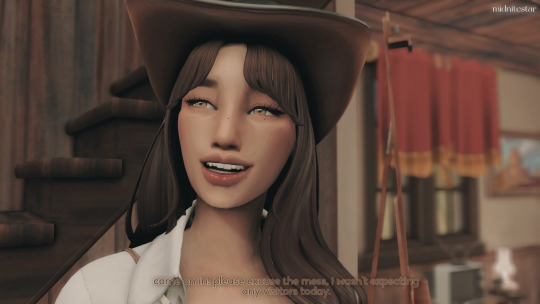
a welcome wagon and a makeshift date.
⸻ the fixer upper ranch challenge: chapter 5
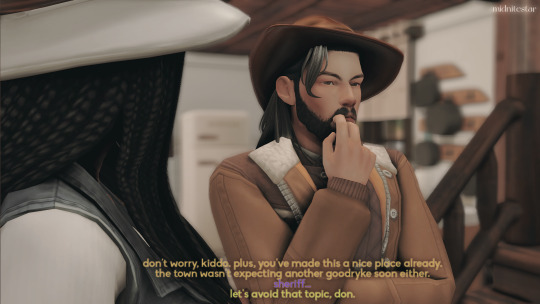

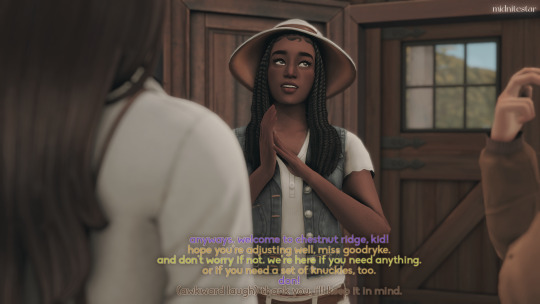
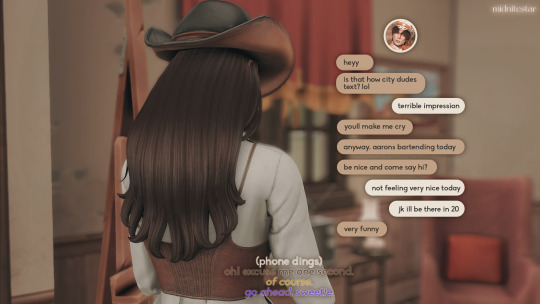
introducing the town's sheriff, don gooseman; the renowned horse racing champion, sienna grove; and girl-next-door, autumn.





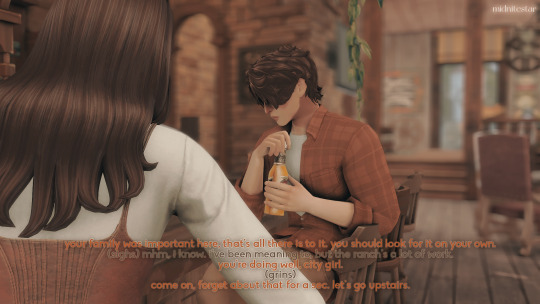
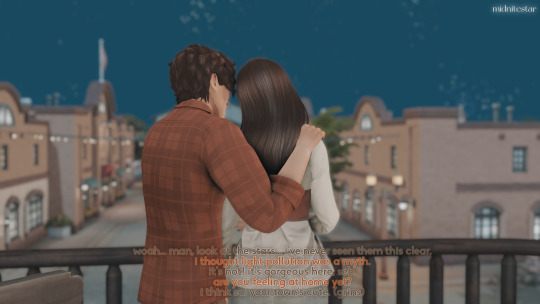
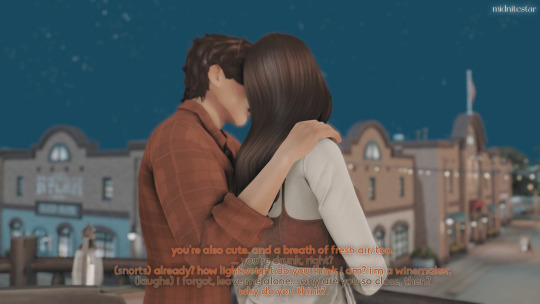

read from the beginning here!
#READ THE WHOLE THING#THEY FINALLY DID IT#my sillies#*paige goodryke#*seb goodwin#fixer upper ranch challenge#the sims 4#ts4 simblr#ts4 gameplay#ts4 legacy#ts4 screenies#ts4 screenshots#ts4 story
2 notes
·
View notes
Text
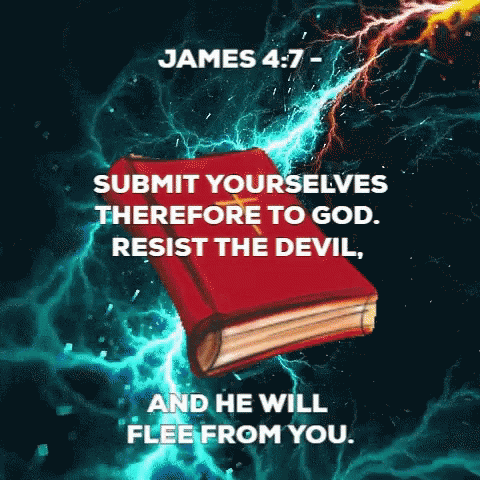
14 notes
·
View notes
Text
I… have a confession to make.
I’m homophobic.
Not in the traditional sense though. As in, everyone in the queer community is so cool and awesome and approaching them is terrifying.
#Read the whole thing#not just the second line#It’s supposed to be funny#If it’s not please alert me to the fact and I shall remedy#Random rambles of my unhinged mind#Farewell fellow humans
2 notes
·
View notes
Text
From A Fat Artist
TW: Weight talk, ED talk, Fatphobia, Depressive Mental Illness, Diet Culture
For a TL;DR: a vague but comprehensive insert of my feelings on some art policing in a certain podcast fandom right now
Please read at your own discretion
I suffered from ED for the better half of my life. At 21, I can finally say I have broken a lot of old habits and I’ve been keeping myself pretty stable on my weight. It wasn’t always like this. I used to do pretty much... any diet that my mother was on? Weight watchers, Atkins, South Beach, all of these frequented the household I lived in. I did Keto, Low Carb, Carb Addict especially. My mother deemed I had a problem with how I looked and she pushed that onto me from her own projections since probably junior high.
I had stages of my life where my weight fluctuated by the tens and twenties. I’d rapidly lose 20 pounds of “water weight” during my keto and no carb days within a week or two, only to break my diet from stress and immediately gain 40 in a couple of days. This was the point that I had the lowest self-image. I was broken, I was suffering from constant diet culture. You weren’t allowed to eat past 6 PM, you couldn’t eat a big dinner, no carbs, bread makes you fat, sugars are bad, don’t eat sweets. These mantras sat on my shoulders every day. I feared going to the vending machine in high school to grab a sweet treat that I’d been depriving myself for WEEKS because one wrong look sent my ED mindset into overdrive.
I bring all of this up for a reason, I promise. I’m not torturing you with my ED senselessly.
I lost a LOT of weight during that time. I also gained weight, but mostly I lost a lot of weight. I had people who constantly commented about how good I looked. But I didn’t feel that way. I was malnourished, underfed, I felt like I was wasting away. I was UNHAPPY. But the alternative was to feel uncomfortable in dressing rooms. I had people spreading rumors about my stretch marks, which didn’t help. They were talking about how morbidly obese I was, how ugly and disgusting I looked, how they didn’t want to get close to me because “what if they smell” because they assumed that because I was fat I was unhygienic.
If someone is losing weight, they don’t always have to be happy about it. Take me for example if nobody else. I was ill. I was lonely. I was depressed. I was thinner. While weight loss may be a milestone for some, it’s a sign of issue for others.
Weight loss as a means of showing bad states of mind is very uncommon in media. It’s treated as the best thing to happen to the Ugly Fat Girl in High School, it’s seen as the Only Way To Get Girls if you’re a straight guy. Weight GAIN is seen as even worse, when Regina gains weight in Mean Girls, it’s seen as terrible. Now obviously that’s more nuanced, but it’s still an issue. Let people indulge in what they want. Gaining weight is not bad.
I’m not criticizing old media, though, for outdated views. I’m criticizing people NOW. Someone drawing weight loss on a fat character is Not The End Of The World. ESPECIALLY if this is during a turbulent and low point in a character’s life. Obviously, there can be disagreement, some people can see it differently, but overall, that’s up to the creative choice in the artist. Not only that, but it can be a source of projection for someone. I constantly project onto characters because of how I feel or how something affects me. It’s a form of therapeutic escapism and relief. Do I think that’s canon? Probably not. But does it make me feel better? Absolutely. Seeing someone in media share what I feel can provide a sense of comfort to me. A sense of belonging.
When someone projects onto a character in a way you don’t like, it is not an excuse for you to call them a bigot in some way. That is their personal feelings. Especially if the people who actually are “to be affected” by it don’t agree with you, just. Move on.
As a fat artist, if I see someone drawing a fat character losing weight as a result of sickness, or is stated that it’s bad, I’m not going to be bothered by that. Because that’s my own personal viewpoint. But hearing a bunch of non-fat people talk about how “you’re being fatphobic, I’m speaking for fat people” when you don’t know how the fat people actually feel, as well as try to make others feel like shit, ESPECIALLY if you’re trying to gatekeep or police art or fan content in media? That’s more triggering than the art piece itself, and that’s a problem.
#fat person#fat artist#long post#read the trigger warnings#read the whole thing#serious post#please don't @ or put names in it#i kept it vague for a reason#iykyk
10 notes
·
View notes
Text

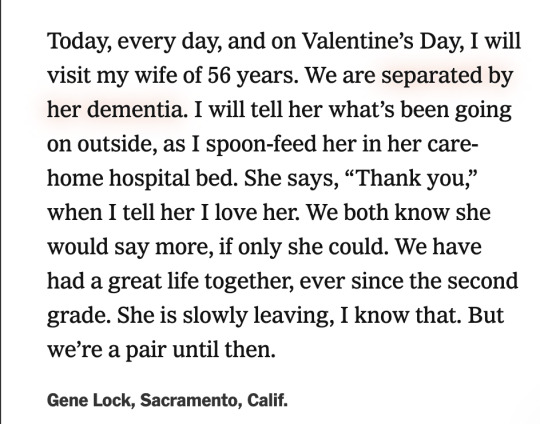
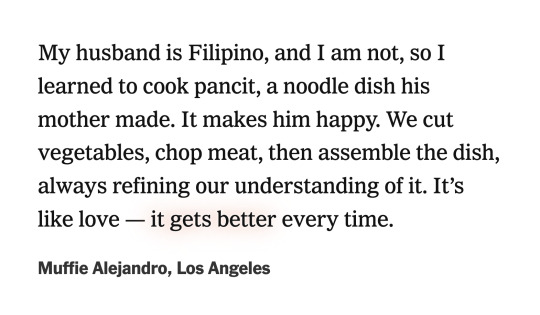


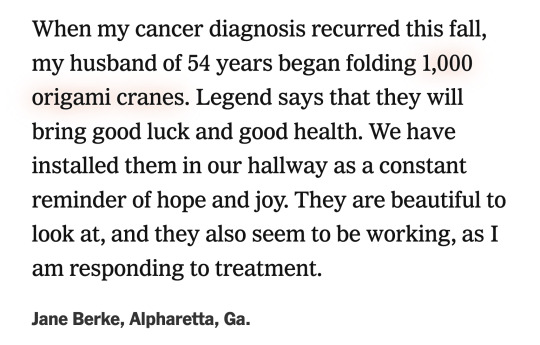
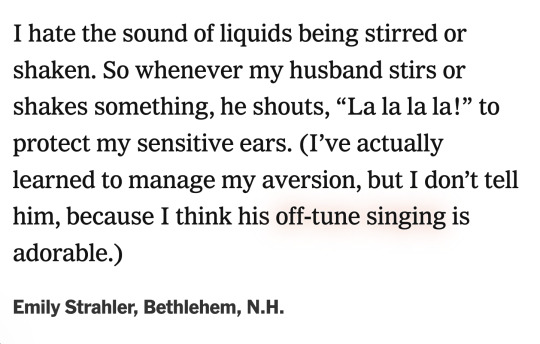

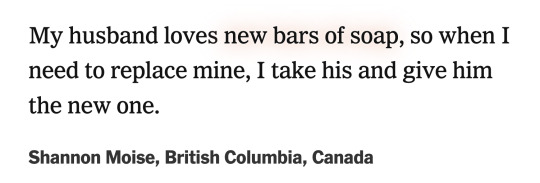

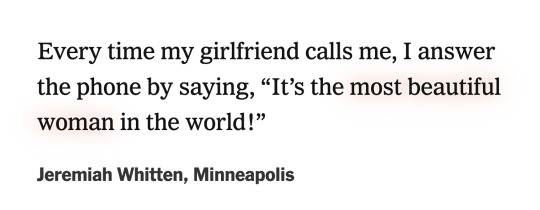


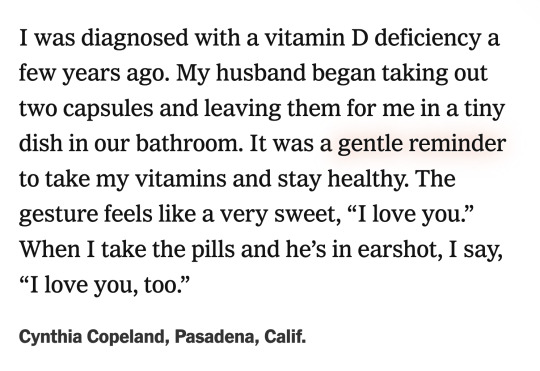


The New York Times did a piece titled 100 Small Acts of Love and these are some of my favorites 💕
#not gonna lie i was sobbing while reading the whole thing#they're all right without tenderness we are in hell#my upload#call it what it is; love
20K notes
·
View notes
Text
This is eliminationism. I’m sorry, I know that sounds Alex Jones-ish, but there’s no other word for it. I have known these people in real life. I have spoken to them outside of public forums. They are not joking. They are not exaggerating. They want to eliminate a large segment of the population. Those who insist this is a metaphor or a mere affect-generating exaggeration are full of shit.
Or... hmm... are they just full of shit? Most people aren’t that cynical, right?
This type of discourse is tolerated/celebrated by today’s left because lefties still don’t fully regard non-white people as people. They don’t hate PoC, at least not outright, but they also don’t think they should be taken seriously.
Because if you do take a person seriously—if you regard them as a fully formed human being endowed with agency, rather than as an avatar for your political fantasies—you’re not going to nod and laugh and cheer when they tell you, to your face, that they fantasize about killing you.
…
Deep down, most left-identitarians know this. That’s why they tolerate open and barely equivocal calls for their own death: things aren’t that bad here in the ol’ U S of A, so surely we won’t face any major blowups--it’s fine to pour more gas on the fire, especially if it keeps Drumpf out of office. But this misunderstands both the nature of anger and the humanity of non-white people. If a person says something, you should not default to assuming that they actually don’t mean what just came out of their mouth. If a man shoots his wife because he thinks she cheated on him, she’s still dead regardless of whether or not she actually cheated.
(@mitigatedchaos)
2 notes
·
View notes
Text
It's about the type of guy he represents. He is not the toxic bro, but he’s friends with him. He supports him. He calls out the nameless, faceless bad guys, but not the ones he’s friends with. Phantoms are easier to fight than buddies, after all. He’s the type of guy who benefits from patriarchy while still being the good guy because he’s not as bad as the rest of them. It’s building a life to look good, without actually doing the radical work of being good. He’s #NotAllMen, the ones who don’t actively do harm, but maybe don’t actively do good, either.
It might be unfair to lash out at these kinds of guys. But in so many ways they create the environment where the others thrive. This type of guy is the cytoplasm of the patriarchy, the fluid that holds it all together.
-- Lyz Lenz, A good man is hard to find
3 notes
·
View notes